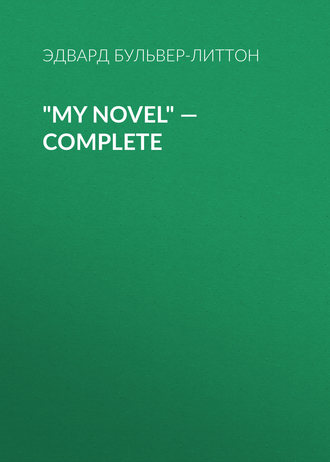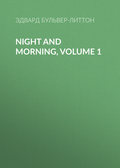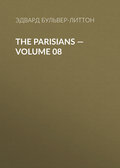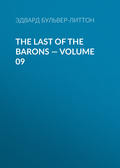
Эдвард Бульвер-Литтон
"My Novel" — Complete
CHAPTER XIV
The parson joined Mr. Richard Avenel on the road. It was a fine night, and the moon clear and shining.
“So, then,” said Mr. Richard, thoughtfully, “poor Jane, who was always the drudge of the family, has contrived to bring up her son well; and the boy is really what you say, eh,—could make a figure at college?”
“I am sure of it,” said the parson, hooking himself on to the arm which Mr. Avenel proffered.
“I should like to see him,” said Richard. “Has he any manner? Is he genteel, or a mere country lout?”
“Indeed, he speaks with so much propriety, and has so much modest dignity about him, that there’s many a rich gentleman who would be proud of such a son.”
“It is odd,” observed Richard, “what a difference there is in families. There’s Jane, now, who can’t read nor write, and was just fit to be a workman’s wife, had not a thought above her station; and when I think of my poor sister Nora—you would not believe it, sir, but she was the most elegant creature in the world,—yes, even as a child (she was but a child when I went off to America). And often, as I was getting on in life, often I used to say to myself, ‘My little Nora shall be a lady after all.’ Poor thing—but she died young.” Richard’s voice grew husky.
The parson kindly pressed the arm on which he leaned, and said, after a pause,—
“Nothing refines us like education, sir. I believe your sister Nora had received much instruction, and had the talents to profit by it: it is the same with your nephew.”
“I’ll see him,” said Richard, stamping his foot firmly on the ground, “and if I like him, I’ll be as good as a father to him. Look you, Mr.—what’s your name, sir?”
“Dale.”
“Mr. Dale, look you, I’m a single man. Perhaps I may marry some day; perhaps I sha’ n’t. I’m not going to throw myself away. If I can get a lady of quality, why—but that’s neither here nor there; meanwhile I should be glad of a nephew whom I need not be ashamed of. You see, sir, I am a new man, the builder of my own fortunes; and though I have picked up a little education—I don’t well know how,—as I scramble on still, now I come back to the old country, I’m well aware that I ‘m not exactly a match for those d—-d aristocrats; don’t show so well in a drawing-room as I could wish. I could be a parliament man if I liked, but I might make a goose of myself; so, all things considered, if I can get a sort of junior partner to do the polite work, and show off the goods, I think the house of Avenel & Co. might become a pretty considerable honour to the Britishers. You understand me, sir?”
“Oh, very well,” answered Mr. Dale, smiling, though rather gravely.
“Now,” continued the New Man, “I’m not ashamed to have risen in life by my own merits; and I don’t disguise what I’ve been. And, when I’m in my own grand house, I’m fond of saying, ‘I landed at New York with L10 in my purse, and here I am!’ But it would not do to have the old folks with me. People take you with all your faults if you’re rich; but they won’t swallow your family into the bargain. So if I don’t have at my house my own father and mother, whom I love dearly, and should like to see sitting at table, with my servants behind their chairs, I could still less have sister Jane. I recollect her very well, but she can’t have got genteeler as she’s grown older. Therefore I beg you’ll not set her on coming after me! it would not do by any manner of means. Don’t say a word about me to her. But send the boy down here to his grandfather, and I’ll see him quietly, you understand.”
“Yes, but it will be hard to separate her from the boy.”
“Stuff! all boys are separated from their parents when they go into the world. So that’s settled. Now, just tell me. I know the old folks always snubbed Jane,—that is, Mother did. My poor dear father never snubbed any of us. Perhaps Mother has not behaved altogether well to Jane. But we must not blame her for that; you see this is how it happened. There were a good many of us, while Father and Mother kept shop in the High Street, so we were all to be provided for anyhow; and Jane, being very useful and handy at work, got a place when she was a little girl, and had no time for learning. Afterwards my father made a lucky hit, in getting my Lord Lansmere’s custom after an election, in which he did a great deal for the Blues (for he was a famous electioneerer, my poor father). My Lady stood godmother to Nora; and then all my brothers, and two of my sisters, died off, and Father retired from business; and when he took Jane from service, she was so common-like that Mother could not help contrasting her with Nora. You see Jane was their child when they were poor little shop-people, with their heads scarce above water; and Nora was their child when they were well off, and had retired from trade, and lived genteel: so that makes a great difference. And Mother did not quite look on her as on her own child. But it was Jane’s own fault: for Mother would have made it up with her if she had married the son of our neighbour the great linen-draper, as she might have done; but she would take Mark Fairfield, a common carpenter. Parents like best those of their children who succeed best in life. Natural. Why, they did not care for me till I came back the man I am. But to return to Jane: I’m afraid they’ve neglected her. How is she off?”
“She earns her livelihood, and is poor, but contented.”
“Ah, just be good enough to give her this” (and Richard took a bank-note of L50 from his pocket-book).
“You can say the old folks sent it to her; or that it is a present from Dick, without telling her he has come back from America.”
“My dear sir,” said the parson, “I am more and more thankful to have made your acquaintance. This is a very liberal gift of yours; but your best plan will be to send it through your mother. For, though I don’t want to betray any confidence you place in me, I should not know what to answer if Mrs. Fairfield began to question me about her brother. I never had but one secret to keep, and I hope I shall never have another. A secret is very like a lie!”
“You had a secret then?” said Richard, as he took back the bank-note. He had learned, perhaps in America, to be a very inquisitive man. He added point-blank, “Pray, what was it?”
“Why, what it would not be if I told you,” said the parson, with a forced laugh,—“a secret!”
“Well, I guess we’re in a land of liberty. Do as you like. Now, I dare say you think me a very odd fellow to come out of my shell to you in this off-hand way; but I liked the look of you, even when we were at the inn together. And just now I was uncommonly pleased to find that, though you are a parson, you don’t want to keep a man’s nose down to a shopboard, if he has anything in him. You’re not one of the aristocrats—”
“Indeed,” said the parson, with imprudent warmth, “it is not the character of the aristocracy of this country to keep people down. They make way amongst themselves for any man, whatever his birth, who has the talent and energy to aspire to their level. That’s the especial boast of the British constitution, sir!”
“Oh, you think so, do you?” said Mr. Richard, looking sourly at the parson. “I dare say those are the opinions in which you have brought up the lad. Just keep him yourself and let the aristocracy provide for him!”
The parson’s generous and patriotic warmth evaporated at once, at this sudden inlet of cold air into the conversation. He perceived that he had made a terrible blunder; and as it was not his business at that moment to vindicate the British constitution, but to serve Leonard Fairfield, he abandoned the cause of the aristocracy with the most poltroon and scandalous abruptness. Catching at the arm which Mr. Avenel had withdrawn from him, he exclaimed,—
“Indeed, sir, you are mistaken; I have never attempted to influence your nephew’s political opinions. On the contrary, if, at his age, he can be said to have formed any opinions, I am greatly afraid—that is, I think his opinions are by no means sound—that is, constitutional. I mean, I mean—” And the poor parson, anxious to select a word that would not offend his listener, stopped short in lamentable confusion of idea.
Mr. Avenel enjoyed his distress for a moment, with a saturnine smile, and then said,—
“Well, I calculate he’s a Radical. Natural enough, if he has not got a sixpence to lose—all come right by and by. I’m not a Radical,—at least not a Destructive—much too clever a man for that, I hope. But I wish to see things very different from what they are. Don’t fancy that I want the common people, who’ve got nothing, to pretend to dictate to their betters, because I hate to see a parcel of fellows who are called lords and squires trying to rule the roast. I think, sir, that it is men like me who ought to be at the top of the tree! and that’s the long and the short of it. What do you say?”
“I’ve not the least objection,” said the crestfallen parson, basely. But, to do him justice, I must add that he did not the least know what he was saying!
CHAPTER XV
Unconscious of the change in his fate which the diplomacy of the parson sought to effect, Leonard Fairfield was enjoying the first virgin sweetness of fame; for the principal town in his neighbourhood had followed the then growing fashion of the age, and set up a Mechanics’ Institute, and some worthy persons interested in the formation of that provincial Athenaeum had offered a prize for the best Essay on the Diffusion of Knowledge,—a very trite subject, on which persons seem to think they can never say too much, and on which there is, nevertheless, a great deal yet to be said. This prize Leonard Fairfield had recently won. His Essay had been publicly complimented by a full meeting of the Institute; it had been printed at the expense of the Society, and had been rewarded by a silver medal,—delineative of Apollo crowning Merit (poor Merit had not a rag to his back; but Merit, left only to the care of Apollo, never is too good a customer to the tailor!) And the County Gazette had declared that Britain had produced another prodigy in the person of Dr. Riccabocca’s self-educated gardener.
Attention was now directed to Leonard’s mechanical contrivances. The squire, ever eagerly bent on improvements, had brought an engineer to inspect the lad’s system of irrigation, and the engineer had been greatly struck by the simple means by which a very considerable technical difficulty had been overcome. The neighbouring farmers now called Leonard “Mr. Fairfield,” and invited him on equal terms to their houses. Mr. Stirn had met him on the high road, touched his hat, and hoped that “he bore no malice.” All this, I say, was the first sweetness of fame; and if Leonard Fairfield comes to be a great man, he will never find such sweets in the after fruit. It was this success which had determined the parson on the step which he had just taken, and which he had long before anxiously meditated. For, during the last year or so, he had renewed his old intimacy with the widow and the boy; and he had noticed, with great hope and great fear, the rapid growth of an intellect, which now stood out from the lowly circumstances that surrounded it in bold and unharmonizing relief.
It was the evening after his return home that the parson strolled up to the Casino. He put Leonard Fairfield’s Prize Essay in his pocket; for he felt that he could not let the young man go forth into the world without a preparatory lecture, and he intended to scourge poor Merit with the very laurel wreath which it had received from Apollo. But in this he wanted Riccabocca’s assistance; or rather he feared that, if he did not get the philosopher on his side, the philosopher might undo all the work of the parson.
CHAPTER XVI
A sweet sound came through the orange boughs, and floated to the ears of the parson, as he wound slowly up the gentle ascent,—so sweet, so silvery, he paused in delight—unaware, wretched man! that he was thereby conniving at Papistical errors. Soft it came and sweet; softer and sweeter,—“Ave Maria!” Violante was chanting the evening hymn to the Virgin Mother. The parson at last distinguished the sense of the words, and shook his head with the pious shake of an orthodox Protestant. He broke from the spell resolutely, and walked on with a sturdy step. Gaining the terrace, he found the little family seated under an awning,—Mrs. Riccabocca knitting; the signor with his arms folded on his breast: the book he had been reading a few moments before had fallen on the ground, and his dark eyes were soft and dreamy. Violante had finished her hymn, and seated herself on the ground between the two, pillowing her head on her stepmother’s lap, but with her hand resting on her father’s knee, and her gaze fixed fondly on his face.
“Good-evening,” said Mr. Dale. Violante stole up to him, and, pulling him so as to bring his ear nearer to her lip, whispered, “Talk to Papa, do,—and cheerfully; he is sad.”
She escaped from him as she said this, and appeared to busy herself with watering the flowers arranged on stands round the awning. But she kept her swimming lustrous eyes wistfully on her father.
“How fares it with you, my dear friend?” said the parson, kindly, as he rested his hand on the Italian’s shoulder. “You must not let him get out of spirits, Mrs. Riccabocca.”
“I am very ungrateful to her if I ever am so,” said the poor Italian, with all his natural gallantry. Many a good wife, who thinks it is a reproach to her if her husband is ever “out of spirits,” might have turned peevishly from that speech, more elegant than sincere, and so have made bad worse; but Mrs. Riccabocca took her husband’s proffered hand affectionately, and said with great naivete,—
“You see I am so stupid, Mr. Dale; I never knew I was so stupid till I married. But I am very glad you are come. You can get on some learned subject together, and then he will not miss so much his—”
“His what?” asked Riccabocca, inquisitively.
“His country. Do you think that I cannot sometimes read your thoughts?”
“Very often. But you did not read them just then. The tongue touches where the tooth aches, but the best dentist cannot guess at the tooth unless one open one’s mouth.—Basta! Can we offer you some wine of our own making, Mr. Dale?—it is pure.”
“I ‘d rather have some tea,” quoth the parson, hastily. Mrs. Riccabocca, too pleased to be in her natural element of domestic use, hurried into the house to prepare our national beverage. And the parson, sliding into her chair, said,—
“But you are dejected then? Fie! If there’s a virtue in the world at which we should always aim, it is cheerfulness.”
“I don’t dispute it,” said Riccabocca, with a heavy sigh. “But though it is said by some Greek, who, I think, is quoted by your favourite Seneca, that a wise man carries his country with him at the soles of his feet, he can’t carry also the sunshine over his head.”
“I tell you what it is,” said the parson, bluntly; “you would have a much keener sense of happiness if you had much less esteem for philosophy.”
“Cospetto!” said the doctor, rousing himself. “Just explain, will you?”
“Does not the search after wisdom induce desires not satisfied in this small circle to which your life is confined? It is not so much your country for which you yearn, as it is for space to your intellect, employment for your thoughts, career for your aspirations.”
“You have guessed at the tooth which aches,” said Riccabocca, with admiration.
“Easy to do that,” answered the parson. “Our wisdom teeth come last and give us the most pain; and if you would just starve the mind a little, and nourish the heart more, you would be less of a philosopher and more of a—” The parson had the word “Christian” at the tip of his tongue; he suppressed a word that, so spoken, would have been exceedingly irritating, and substituted, with elegant antithesis, “and more of a happy man!”
“I do all I can with my heart,” quoth the doctor.
“Not you! For a man with such a heart as yours should never feel the want of the sunshine. My friend, we live in an age of over mental cultivation. We neglect too much the simple healthful outer life, in which there is so much positive joy. In turning to the world within us, we grow blind to this beautiful world without; in studying ourselves as men, we almost forget to look up to heaven, and warm to the smile of God.”
The philosopher mechanically shrugged his shoulders, as he always did when another man moralized,—especially if the moralizer were a priest; but there was no irony in his smile, as he answered thoughtfully,—
“There is some truth in what you say. I own that we live too much as if we were all brain. Knowledge has its penalties and pains, as well as its prizes.”
“That is just what I want you to say to Leonard.”
“How have you settled the object of your journey?”
“I will tell you as we walk down to him after tea. At present, I am rather too much occupied with you.”
“Me? The tree is formed—try only to bend the young twig!”
“Trees are trees, and twigs twigs,” said the parson, dogmatically; “but man is always growing till he falls into the grave. I think I have heard you say that you once had a narrow escape of a prison?”
“Very narrow.”
“Just suppose that you were now in that prison, and that a fairy conjured up the prospect of this quiet home in a safe land; that you saw the orange-trees in flower, felt the evening breeze on your cheek; beheld your child gay or sad, as you smiled or knit your brow; that within this phantom home was a woman, not, indeed, all your young romance might have dreamed of, but faithful and true, every beat of her heart all your own,—would you not cry from the depth of your dungeon, ‘O fairy! such a change were a paradise!’ Ungrateful man! you want interchange for your mind, and your heart should suffice for all!”
Riccabocca was touched and silent.
“Come hither, my child,” said Mr. Dale, turning round to Violante, who stood still among the flowers, out of hearing, but with watchful eyes. “Come hither,” he said, opening his arms.
Violante bounded forward, and nestled to the good man’s heart.
“Tell me, Violante, when you are alone in the fields or the garden, and have left your father looking pleased and serene, so that you have no care for him at your heart,—tell me, Violante, though you are all alone, with the flowers below, and the birds singing overhead, do you feel that life itself is happiness or sorrow?”
“Happiness!” answered Violante, half shutting her eyes, and in a measured voice.
“Can you explain what kind of happiness it is?”
“Oh, no, impossible! and it is never the same. Sometimes it is so still—so still, and sometimes so joyous, that I long for wings to fly up to God, and thank Him!”
“O friend,” said the parson, “this is the true sympathy between life and nature, and thus we should feel ever, did we take more care to preserve the health and innocence of a child. We are told that we must become as children to enter into the kingdom of Heaven; methinks we should also become as children to know what delight there is in our heritage of earth!”
CHAPTER XVII
The maid-servant (for Jackeymo was in the fields) brought the table under the awning, and with the English luxury of tea, there were other drinks as cheap and as grateful on summer evenings,—drinks which Jackeymo had retained and taught from the customs of the South,—unebriate liquors, pressed from cooling fruits, sweetened with honey, and deliciously iced: ice should cost nothing in a country in which one is frozen up half the year! And Jackeymo, too, had added to our good, solid, heavy English bread preparations of wheat much lighter, and more propitious to digestion,—with those crisp grissins, which seem to enjoy being eaten, they make so pleasant a noise between one’s teeth.
The parson esteemed it a little treat to drink tea with the Riccaboccas. There was something of elegance and grace in that homely meal at the poor exile’s table, which pleased the eye as well as taste. And the very utensils, plain Wedgwood though they were, had a classical simplicity, which made Mrs. Hazeldean’s old India delf, and Mrs. Dale’s best Worcester china, look tawdry and barbarous in comparison. For it was Flaxman who gave designs to Wedgwood, and the most truly refined of all our manufactures in porcelain (if we do not look to the mere material) is in the reach of the most thrifty.
The little banquet was at first rather a silent one; but Riccabocca threw off his gloom, and became gay and animated. Then poor Mrs. Riccabocca smiled, and pressed the grissins; and Violante, forgetting all her stateliness, laughed and played tricks on the parson, stealing away his cup of warm tea when his head was turned, and substituting iced cherry-juice. Then the parson got up and ran after Violante, making angry faces, and Violante dodged beautifully, till the parson, fairly tired out, was too glad to cry “Peace,” and come back to the cherry-juice. Thus time rolled on, till they heard afar the stroke of the distant church-clock, and Mr. Dale started up and cried, “But we shall be too late for Leonard. Come, naughty little girl, get your father his hat.”
“And umbrella!” said Riccabocca, looking up at the cloudless, moonlit sky.
“Umbrella against the stars?” asked the parson, laughing. “The stars are no friends of mine,” said Riccabocca, “and one never knows what may happen!”
The philosopher and the parson walked on amicably.
“You have done me good,” said Riccabocca, “but I hope I am not always so unreasonably melancholic as you seem to suspect. The evenings will sometimes appear long, and dull too, to a man whose thoughts on the past are almost his sole companions.”
“Sole companions?—your child?”
“She is so young.”
“Your wife?”
“She is so—” the bland Italian appeared to check some disparaging adjective, and mildly added, “so good, I allow; but you must own that she and I cannot have much in common.”
“I own nothing of the sort. You have your house and your interests, your happiness and your lives, in common. We men are so exacting, we expect to find ideal nymphs and goddesses when we condescend to marry a mortal; and if we did, our chickens would be boiled to rags, and our mutton come up as cold as a stone.”
“Per Bacco, you are an oracle,” said Riccabocca, laughing. “But I am not so sceptical as you are. I honour the fair sex too much. There are a great many women who realize the ideal of men, to be found in—the poets!”
“There’s my dear Mrs. Dale,” resumed the parson, not heeding the sarcastic compliment to the sex, but sinking his voice into a whisper, and looking round cautiously,—“there’s my dear Mrs. Dale, the best woman in the world,—an angel I would say, if the word were not profane; BUT—”
“What’s the BUT?” asked the doctor, demurely.
“BUT I too might say that ‘she and I have not much in common,’ if I were only to compare mind to mind, and when my poor Carry says something less profound than Madame de Stael might have said, smile on her in contempt from the elevation of logic and Latin. Yet when I remember all the little sorrows and joys that we have shared together, and feel how solitary I should have been without her—oh, then, I am instantly aware that there is between us in common something infinitely closer and better than if the same course of study had given us the same equality of ideas; and I was forced to brace myself for a combat of intellect, as I am when I fall in with a tiresome sage like yourself. I don’t pretend to say that Mrs. Riccabocca is a Mrs. Dale,” added the parson, with lofty candour,—“there is but one Mrs. Dale in the world; but still, you have drawn a prize in the wheel matrimonial! Think of Socrates, and yet he was content even with his—Xantippe!”
Dr. Riccabocca called to mind Mrs. Dale’s “little tempers,” and inly rejoiced that no second Mrs. Dale had existed to fall to his own lot. His placid Jemima gained by the contrast. Nevertheless he had the ill grace to reply, “Socrates was a man beyond all imitation!—Yet I believe that even he spent very few of his evenings at home. But revenons a nos moutons, we are nearly at Mrs. Fairfield’s cottage, and you have not yet told me what you have settled as to Leonard.”
The parson halted, took Riccabocca by the button, and informed him, in very few words, that Leonard was to go to Lansmere to see some relations there, who had the fortune, if they had the will, to give full career to his abilities.
“The great thing, in the mean while,” said the parson, “would be to enlighten him a little as to what he calls—enlightenment.”
“Ah!” said Riccabocca, diverted, and rubbing his hands, “I shall listen with interest to what you say on that subject.”
“And must aid me: for the first step in this modern march of enlightenment is to leave the poor parson behind; and if one calls out ‘Hold! and look at the sign-post,’ the traveller hurries on the faster, saying to himself, ‘Pooh, pooh!—that is only the cry of the parson!’ But my gentleman, when he doubts me, will listen to you,—you’re a philosopher!”
“We philosophers are of some use now and then, even to parsons!”
“If you were not so conceited a set of deluded poor creatures already, I would say ‘Yes,’” replied the parson, generously; and, taking hold of Riccabocca’s umbrella, he applied the brass handle thereof, by way of a knocker, to the cottage door.







